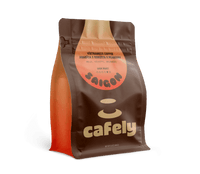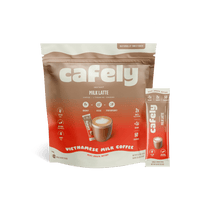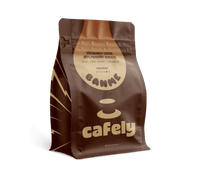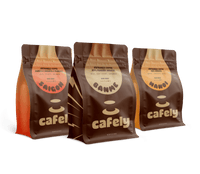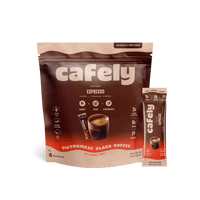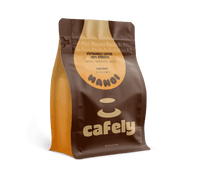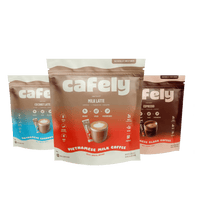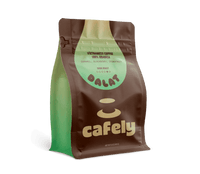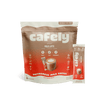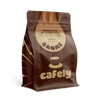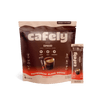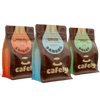Roughly 60% of your brain is made of fat, and essential fatty acids like omega-3s help maintain its structure and support clear thinking [1].
If your mind feels cloudy, unfocused, or sluggish, your meals might be part of the problem.
The good news? Certain foods can help clear the mental haze and fuel better focus, memory, and clarity.
In this article, we’ll cover the best foods for brain fog, natural dietary fixes, and how small changes can make a big difference in how sharp you feel each day.
Let’s start with your plate.
10 Dietary Strategies to Combat Brain Fog
When it comes to brain fog remedies, what you eat is one of the easiest things to change — and it can make a big difference, fast.
Here are 10 ways you can build a brain-friendly plate that supports focus, memory, and mental clarity.
1. Fatty Fish: Omega-3s for Brain Power

Fatty fish like salmon, sardines, and mackerel are loaded with DHA — a type of omega-3 fatty acid that takes up a large portion of your brain’s structure [2].
Health benefits of fatty fish:
- Supports memory, learning, and mood regulation.
- Reduces inflammation that may contribute to mental fog.
- Especially helpful in diets low in healthy fats.
Try grilled salmon or sardines on toast a few times a week to nourish your brain.
2. Dark Leafy Greens: Brain-Protective Vitamins
Spinach, kale, and Swiss chard are rich in folate, vitamin K, and lutein — all linked to slower cognitive decline [3].
Why dark leafy greens improve mental function:
- Folate supports neurotransmitter function.
- Vitamin K plays a role in memory formation.
- Antioxidants protect against cellular damage.
A green smoothie or sautéed greens with olive oil is an easy way to boost your intake.
3. Berries: Natural Brain Defenders
Blueberries, raspberries, and blackberries pack a punch when it comes to antioxidants.
Why berries are a smart choice for mental clarity:
- Rich in flavonoids that reduce inflammation.
- May improve memory and mental processing.
- Can help combat oxidative stress linked to brain fog.
Enjoy a handful of berries with breakfast or add them to plain yogurt for a smart snack.
4. Nuts & Seeds: Healthy Fats + Vitamin E
These tiny powerhouses fuel your brain with key nutrients and steady energy.
How nuts and seeds support mental sharpness and memory:
- Almonds and sunflower seeds are rich in vitamin E.
- Flaxseeds and chia contain plant-based omega-3s.
- Promote sharper thinking and better memory retention.
Toss them into oatmeal, salads, or eat them on their own as a crunchy afternoon pick-me-up.
5. Whole Grains: Slow-Burning Brain Fuel
Your brain needs a steady stream of glucose, and refined sugar spikes won’t cut it.
Whole grains provide long-lasting energy that your brain can rely on:
- Brown rice, oats, and quinoa offer complex carbs.
- Help stabilize blood sugar and energy levels.
- Keep your focus steady without mid-morning crashes.
Try overnight oats or a bowl of quinoa and veggies to support your mental performance.
6. Walnuts: The Brain-Shaped Superfood
Walnuts are basically shaped like mini brains, and that may not be a coincidence.
Walnuts deliver powerful nutrients that directly support brain performance:
- High in omega-3s, especially alpha-linolenic acid (ALA).
- Packed with polyphenols and vitamin E.
- Shown in studies to support memory and reduce brain inflammation.
Sprinkle chopped walnuts on cereal or snack on them plain for a brain-friendly boost.
7. Dark Chocolate (70% or Higher): Mood & Focus Enhancer
High-quality dark chocolate delivers more than a treat — it delivers brain benefits, too [4].
How dark chocolate supports your cognitive performance:
- Contains flavonoids that improve blood flow to the brain.
- Includes a touch of caffeine in chocolate for gentle alertness.
- May support memory, concentration, and mental flexibility.
Aim for a small square or two of 70% or higher cocoa content for the best effect.
8. Eggs: Choline for Cognitive Support
Eggs are among the best sources of choline, a nutrient critical to neurotransmitter production.
Why eggs deserve a spot in your brain-boosting diet:
- Helps synthesize acetylcholine, which supports learning and memory.
- Also delivers protein and B12 for brain energy.
- Great option for breakfast or a midday protein boost.
Boiled, scrambled, or poached eggs are a no-brainer for brain fog treatment.
9. Beets: Better Blood Flow = Better Brain
Beets might not be everyone’s favorite, but they’re a top pick for circulation and brain oxygenation.
How beets can help sharpen your thinking:
- High in dietary nitrates that widen blood vessels.
- Boost blood flow to key brain regions.
- May improve reaction time and mental sharpness.
Try beet juice, roasted beets, or blend them into smoothies to keep your brain well-fed.
10. Broccoli: A Detoxifying Brain Booster

This cruciferous veggie does more than fill your plate — it protects your mind.
Why broccoli belongs on your brain fog recovery list:
- Loaded with sulforaphane, an anti-inflammatory compound.
- Helps neutralize toxins that may impair cognitive function.
- Also rich in vitamin C and choline.
Steam it, roast it, or toss it into a stir-fry for a powerful mental boost.
What Not to Eat: Foods That Worsen Brain Fog
Not all foods fuel your brain. Some make things worse. For best results, here are some of the things you can easily cut from your diet for improved mental clarity and performance.
1. Excessive Sugar & Processed Foods
Refined sugar and ultra-processed foods cause energy crashes and inflammation, two major contributors to brain fog [5].
Why sugar is detrimental to optimal brain performance:
- Disrupts blood sugar balance, leading to poor concentration.
- Triggers systemic inflammation that affects brain function.
- Often lacks the nutrients your brain needs to thrive.
Replace sugary cereals, pastries, packaged snacks, and processed carbs with nutrient-rich foods when mental clarity matters.
2. High-Sodium Items
Too much salt can alter blood pressure and impact blood flow to the brain [6].
How high sodium levels can decrease mental clarity:
- Cause brain cells to shrink, reducing cognitive performance over time.
- Linked to increased brain inflammation in high amounts.
- May cause an abundance of proteins linked to various forms of dementia.
Stick with fresh, whole foods seasoned with herbs instead of salt-laden packaged meals and canned soups.
3. Alcohol & Caffeine in Large Amounts
A cup of coffee? Fine. A few glasses of wine or 5 cups of espresso? Not so much.
Why excess alcohol and caffeine can worsen brain fog:
- Alcohol disrupts REM sleep and impairs next-day focus.
- Excessive caffeine leads to jitters, poor sleep, and dependency.
- Promote an increase in anxiety and mental fatigue.
If you want to try waking up without caffeine, try tapering down intake and pairing coffee with brain-boosting foods like eggs or nuts. If you’re using alcohol to wind down, consider replacing it with calming teas or adaptogenic supplements.
Supplements for Brain Fog: 12 Options That May Help
Sometimes food alone isn’t enough. These supplements for brain fog can support brain function, memory, and clarity, especially when you’re under stress, sleep-deprived, or in recovery mode. Here are 12 science-backed supplement options worth considering.
1. Vitamin D
Low levels of vitamin D are linked to fatigue and cognitive dysfunction [7].
Why vitamin D is excellent for mental clarity:
- Supports nerve communication.
- Helps regulate mood and clarity.
- Especially important for those with limited sun exposure.
Look for D3 paired with K2 for better absorption and improved calcium regulation in the brain and body. This combination helps prevent calcium buildup in arteries and ensures it’s delivered to bones and brain tissue where it's actually needed.
2. Omega-3 Fatty Acids
Found in fish oil and algae supplements, omega-3s are crucial for memory and brain structure [8].
How omega-3s provide brain fog relief:
- DHA and EPA (fatty acids) improve neuron communication.
- Reduce inflammation in the brain.
- Support focus, learning, and cognitive longevity.
A top choice if your diet lacks fatty fish, since supplements are easy to take and do not require major changes to your meals.
3. Magnesium
Magnesium is essential for neurotransmission and relaxation [9].
Key brain benefits of magnesium:
- Helps regulate stress hormones like cortisol.
- Supports energy metabolism in the brain.
- Deficiency is linked to anxiety, fatigue, and irritability.
Magnesium glycinate or L-threonate are preferred forms for brain fog remedies because they’re easier for the body to absorb and more effective at reaching the brain, helping improve clarity and calm without digestive discomfort.
4. Vitamin B Complex
The B vitamins work together to power your brain [10].
Why B vitamins are essential for brain performance:
- B6, B9 (folate), and B12 support neurotransmitters like serotonin and dopamine.
- B1 and B3 help with energy production.
- B5 aids stress response and adrenal health.
A B-complex can support clarity, especially if you're feeling mentally drained.
5. L-Theanine
Found in green tea, this amino acid promotes calm alertness [11].
Why L-theanine is a go-to for clear, focused energy:
- Boosts alpha brain waves for relaxed focus.
- Balances out the overstimulation from caffeine.
- Can help reduce stress-related mental cloudiness.
Use alone or pair with caffeine to stay sharp without the crash.
6. Rhodiola Rosea
This adaptogenic herb may reduce mental fatigue and boost performance while under pressure [12].
How Rhodiola helps sharpen focus when you’re under stress:
- Enhances focus during stressful tasks.
- Supports energy levels without being stimulating.
- May improve resilience to burnout.
Often used by students, professionals, and athletes to fight midday fog.
7. Phosphatidylserine
This phospholipid is a fatty substance that protects your brain cell membranes and plays an important role in communication between cells [13].
Why phosphatidylserine supports brain performance under stress:
- Plays a key role in memory and cognitive processing.
- May improve attention and mood under chronic stress.
- Often used in age-related cognitive support.
Look for soy-free options if you're sensitive to soy or following a soy-free diet. Many supplements now use sunflower-derived phosphatidylserine as a cleaner alternative.
8. Creatine
Yes — the gym supplement. But creatine does more than fuel muscles.
How creatine supports brain energy and focus:
- Boosts ATP (adenosine triphosphate production), the primary energy source in brain cells.
- Supports mental clarity, especially during sleep deprivation.
- May enhance short-term memory and processing speed.
It’s a surprising brain fog remedy because most people associate creatine only with athletic performance. Research shows it plays a vital role in cellular energy — including in the brain — making it useful for cognition, especially in mentally demanding situations or under stress [14].
9. Lion’s Mane Mushroom

A powerful natural way to clear brain fog, Lion’s Mane supports long-term cognitive health [15].
Why Lion’s Mane may help restore mental clarity:
- May stimulate nerve growth factor (NGF).
- Helps regenerate brain cells and protect against decline.
- Could improve memory, focus, and even mood over time.
Look for fruiting body extracts with verified beta-glucan content, as these are the most potent and clinically studied parts of the mushroom. Beta-glucans are the key active compounds responsible for their neuroprotective and cognitive benefits.
10. Ashwagandha
Known for stress reduction, ashwagandha also helps your brain work better under pressure [16].
How ashwagandha helps your brain work better:
- Lowers cortisol, a hormone linked to “foggy brain.”
- Supports calm focus and emotional balance.
- Enhances resilience in mentally demanding periods.
Choose KSM-66 or Sensoril extracts for tested potency — these are the most researched forms, standardized for consistent levels of active compounds that support stress relief and cognitive performance.
11. Panax Ginseng
Used for centuries, ginseng is one of the most popular brain fog remedies worldwide [17].
Here’s how Panax ginseng supports improved cognitive function:
- Increases mental energy and reaction speed.
- Helps reduce fatigue from chronic stress.
- May support memory and alertness, especially in older adults.
Avoid taking ginseng late in the day, as it can disrupt sleep due to its stimulating effects on the nervous system, especially in sensitive individuals or when combined with caffeine.
12. Acetyl-L-Carnitine (ALCAR)
A compound involved in mitochondrial energy production [18].
ALCAR is a smart option for ongoing brain fog. Here’s why:
- Supports mental clarity, especially during fatigue or stress.
- May enhance attention and alertness.
- Linked to improved brain function in aging and neurodegeneration.
A great addition to your stack if mental fatigue is persistent, as ALCAR crosses the blood-brain barrier efficiently and directly fuels energy metabolism in brain cells, making it particularly effective for long-term cognitive support.
Best Caffeine Stacks to Clear Brain Fog Fast
When used right, caffeine can sharpen your focus and cut through brain fog. But pairing it with the right compounds takes its effects to the next level.
Here are six powerful caffeine stacks that actually work.
1. Caffeine + L-Theanine
Caffeine sharpens alertness, but can cause jitters or a crash. L-theanine, a calming amino acid from green tea, balances those effects. Together, they create one of the most effective and well-researched combos for focused, jitter-free energy.
Why it works: Caffeine increases beta brain wave activity (linked to focus), while L-theanine boosts alpha waves (linked to relaxed clarity). Their combined effect helps you stay clear and alert without anxiety.
Best for: Clean, steady focus and productivity boosts.
2. Caffeine + Tyrosine
This combination boosts both energy and mental resilience. Caffeine increases alertness, while tyrosine replenishes stress-depleted neurotransmitters like dopamine and norepinephrine. Together, they help you stay sharp and motivated under pressure by supporting mood, motivation, and stress recovery.
Why it works: Caffeine boosts alertness by blocking adenosine receptors (which promote relaxation and sleepiness) in the brain, while tyrosine regulates energy levels through neurotransmitters and hormones, while improving thyroid function (essential for metabolism and energy production).
Best for: Burnout recovery, intense study sessions, or public speaking.
3. Caffeine + Rhodiola Rosea
This is a powerful combination for mental endurance because it blends stimulation with stress resilience. Caffeine improves brain function, while Rhodiola rosea helps your brain handle prolonged pressure more calmly and efficiently by balancing cortisol levels and reducing fatigue.
Why it works: Caffeine provides the initial mental boost, while Rhodiola rosea, an adaptogen that reduces fatigue, enhances resilience, and protects the brain from stress-induced fog, which helps you stay sharp without burning out.
Best for: Long workdays or mentally draining projects.
4. Caffeine + L-Carnitine (ALCAR)
This combination boosts both mental energy and cellular function. Caffeine provides quick alertness, while ALCAR supports sustained brain performance, helping you fight off bad or inconsistent sleep and low energy.
Why it works: Caffeine sharpens focus quickly, and ALCAR fuels mitochondria (the energy engines of brain cells) to enhance mental performance and help with sleep-related fog and fatigue.
Best for: Morning slumps, sleep-deprived days, or physical + mental exhaustion.
5. Caffeine + Alpha-GPC or CDP-Choline
This pairing sharpens focus while supporting the brain’s memory and learning systems. Caffeine is a central nervous system stimulant, while choline enhances neurotransmission, making the combo ideal for mentally demanding tasks.
Why it works: Choline supports brain cell structure and fuels acetylcholine production (memory neurotransmitter), enhancing learning, attention, and cognitive processing. When combined with caffeine, it can help you feel more mentally precise by improving signal transmission between neurons, leading to clearer, more sustained focus.
Best for: Memory tasks, problem solving, or extended focus work.
6. Caffeine + Ginseng
This traditional-meets-modern stack pairs caffeine’s brain boost with ginseng’s balanced, long-lasting support — ideal when you need steady energy without the crash.
Why it works: Ginseng enhances the energizing effect of caffeine without overstimulation by improving alertness and mood, reducing the chances of caffeine crash, and combating physical and mental fatigue. Ginseng's ability to stabilize energy levels and improve mood also makes it beneficial for easing the symptoms of caffeine withdrawal.
Best for: Mornings when you need a full-spectrum boost.
Positive Lifestyle Habits to Reduce Brain Fog

Supplements and caffeine stacks help, but habits are the real long-term brain fog remedies. Here are 10 proven daily lifestyle strategies to prevent brain fog [19, 20].
1. Sleep Hygiene
Lack of quality sleep is a root cause of mental fog. While most people are already trying to improve their sleep, there are a few habits that can actually help.
Key tips for improving sleep quality:
- Aim for 7 to 9 hours of restful sleep.
- Keep your bedtime and wake time consistent (even on weekends).
- Use blackout curtains and a cool room with temperatures between 60 and 67°F (15.5 to 19.5°C).
- Avoid stimulants by limiting caffeine and alcohol before bed.
Why it matters: Sleep helps your body and mind recharge, and poor sleep can lead to decreased cognitive function, poor emotional regulation, and an increased risk of chronic diseases. Creating a schedule and environment conducive to sleep is one of the most effective ways to get started.
2. Regular Physical Activity
Exercise isn't just good for the body — it's great for the brain.
How movement improves mental clarity:
- Boosts blood flow and oxygen to brain tissue.
- Increases BDNF (brain-derived neurotrophic factor) — a key player in neuroplasticity.
- Reduces cortisol and stress.
Why it matters: When your body isn’t moving, your brain is more lethargic.Movement, particularly aerobic exercise, delivers essential oxygen and nutrients to the brain, improving mood and focus.If you’re a beginner, even short walks improve clarity and energy.
3. Stress Management
Chronic stress fogs up your thinking and memory, leaving you feeling anxious and unable to concentrate.
Smart ways to manage stress and support mental clarity:
- Try deep breathing, meditation, or yoga.
- Use short breaks to reset between work blocks.
- Journaling helps externalize mental clutter.
- Spend time with friends and loved ones.
- Enjoy time in nature, reading, or pursuing hobbies.
Why it matters: Chronic stress can lead to a surge in stress hormones, like cortisol, which can negatively impact attention, focus, and memory.It can also further disrupt your sleep and worsen symptoms of depression and anxiety.All of these factors contribute to brain fog, meaning that managing stress is paramount for keeping your mind clear and sharp.
4. Hydration
Even mild dehydration impairs memory, focus, and mood. Dehydration can cause the brain to shrink, disrupting the natural communication between brain cells.
Smart hydration habits to sharpen your focus:
- Aim for 8 to 10 cups of water a day.
- Start your morning with a glass of water.
- Add electrolytes if active or sweating a lot.
- Keep a water bottle nearby to stay consistent.
Why it matters: Water is vital for numerous body functions, especially in your brain. Staying hydrated can help ensure oxygen and nutrients are reaching the brain effectively and can improve the communication pathways in the brain, which increases processing speed and mental acuity.
5. Practice Digital Detoxing
Too much screen time overloads the brain and interferes with sleep. While it might not be easy to take breaks at first, establishing some rules and routines can help you start to decrease your doom scrolling.
Simple ways to give your brain a break from screens:
- Limit scrolling and multitasking during the day.
- Set screen limits at night (blue light disrupts melatonin).
- Take screen-free breaks every 1 to 2 hours.
- Track your screen usage and set goals for how much time you're online.
- Turn off notifications.
Why it matters: Spending time on digital devices can increase mental clutter and stress, and impair your focus, concentration, and attention span. When you take deliberate breaks from the digital world, it can boost creativity and problem-solving, help you focus on the tasks at hand, and reduce your chances of feeling overwhelmed.
6. Prioritize Mental Downtime
Your brain needs breaks to recharge. If you try to keep your mind running at full capacity from morning until night, you’re likely to experience mental fatigue.
Simple ways to give your mind a rest throughout the day:
- Schedule 10 to 15 minutes of quiet every few hours.
- Avoid cramming tasks or checking emails nonstop.
- Let your mind wander in silence (no music, no phone).
Why it matters: When you let your mind rest, a network in your brain called the DMN (default mode network) becomes active. This network helps to process memories, emotions, future planning, and problem-solving. This strengthens attention and creative thinking.
7. Limit Alcohol & Processed Sugar
Both alcohol and processed sugar spike inflammation and disrupt sleep. Enjoying both in moderation is probably safe, but if you’re struggling with extreme brain fog, it might be time to avoid altogether.
Tips for reducing alcohol and processed sugar for steadier energy:
- Instead of your usual nightcap, try kombucha, herbal teas, mocktails, sparkling waters, or smoothies.
- Set a limit for your weekly intake of alcoholic beverages.
- Plan to enjoy alcoholic beverages when you have downtime (weekends).
- Replace processed snacks and treats with whole foods like fruit and nuts.
Why it matters: Alcohol impairs REM cycles, which are essential for memory and mental recharge. Sugar causes crashes, reduces mental endurance, and lacks nutrients that support brain health.Reducing these helps eliminate brain fog naturally.
8. Stay Consistently Hydrated
Yes, hydration is worth repeating. Rather than chugging a water bottle at the beginning of the day, it’s best to stay hydrated throughout the day for mental balance.
Simple habits to keep your hydration levels steady:
- Sip throughout the day for a balanced approach.
- Carry a reusable bottle so you always have access.
- Drink water before, during, and after physical activities.
- Make sure to drink water with meals.
- Set reminders to help make sure you drink regularly.
Why it matters: Even a 1% drop in hydration affects mood and focus, so keeping your hydration levels consistent can help improve your mental performance and concentration throughout the day.
9. Engage in Brain Training
While the brain is not a muscle, it can be trained to function better the more you use it — similar to muscle training. Keep your mind sharp with activities that promote improved cognitive functions like attention, memory, and problem-solving.
Tactics to challenge your brain and keep it adaptable:
- Do puzzles, memory games, or brain apps.
- Learn a new language, instrument, or hobby.
- Take a new route to work or cook a new recipe.
- Reading expands your knowledge and vocabulary.
- Social interaction stimulates brain activity.
Why it matters: Challenging your brain supports long-term cognitive resilience. When you try new activities, learn a skill, or engage in hobbies, your brain is stimulated, improving your mental capacity and abilities. If you don’t stimulate your brain, you can experience mental atrophy, resulting in cognitive decline.
10. Establish a Wind-Down Routine
A strong evening routine supports better sleep and next-day clarity because it helps your mind and body transition from the stress of the day to a state of rest.
Simple habits that help your brain relax before bed:
- Dim the lights an hour before bed.
- Try chamomile or magnesium-rich herbal teas.
- Light stretching or yoga can release physical tension.
- Reading can calm the mind by focusing your attention.
- Warm baths or showers can relax muscles and promote sleepiness.
Why it matters: When you establish a consistent wind-down routine, you help the body lower cortisol levels and shift from a state of alertness to a more relaxed state. This directly translates to better sleep by regulating the release of melatonin (the sleep hormone), improving your circadian rhythm, and promoting deeper, more restful sleep.
What Is Brain Fog? A Detailed Look

Brain fog is not a medical diagnosis but a commonly reported experience [21]. It feels like mental fuzziness, where your ability to focus, remember, or stay sharp seems dulled. For many, it's not just frustrating — it can disrupt daily life, relationships, and productivity.
Here are the key symptoms of brain fog [20]:
Memory Problems
Struggling to recall recent events, names, or even why you walked into a room. Short-term memory feels unreliable, and tasks like remembering appointments or conversations become harder.
Lack of Mental Clarity
Your thinking feels hazy, like you’re trying to process thoughts through fog. This mental static makes decision-making and planning feel more difficult than usual.
Poor Concentration & Inability to Focus
You start tasks and quickly lose track. It’s harder to maintain attention, tune out distractions, or stay on a single mental thread.
Mental Fatigue
Even simple tasks—like writing an email or following a meeting—leave you feeling drained, as if your brain has hit its limit.
Difficulty Processing Information
Reading or problem-solving takes longer. You might reread the same paragraph several times or find it hard to grasp instructions.
Word-Finding Issues
You pause mid-sentence, fishing for the right word. You rely more on vague terms like “thing” or “stuff” instead of precise vocabulary.
Slow Reaction Time
You might feel like you’re a few beats behind, responding slower to questions, messages, or real-time decisions.
Disorganization
Deadlines slip. To-do lists grow. You miss appointments, lose track of details, and feel mentally scattered.
Low Motivation or Apathy
Tasks that once excited you now feel like chores. A general dullness settles in, even if your energy levels seem fine physically.
Brain Fog: Understanding the Causes
Let’s dig into what could be behind these symptoms. While occasional brain fog is normal, persistent episodes could point to deeper causes, many of which are lifestyle-related and reversible.
1. Poor Sleep Quality
Sleep is prime time for your brain’s cleanup crew. During deep sleep, the glymphatic system clears toxins that build up during the day.
Poor sleep — fragmented or too short — disrupts this process.
Tips for improving sleep quality:
- Aim for 7 to 9 hours of uninterrupted sleep.
- Avoid late-night screen use.
- Don’t indulge in large meals before bed.
- Refrain from drinking alcohol close to bedtime.
- Incorporate a wind-down routine that includes low light, stretching, or reading.
2. The Gut-Brain Connection
The gut houses trillions of microbes that directly impact your brain via the vagus nerve. When gut health is poor, your brain suffers.
Support your gut with:
- Fermented foods like kefir or sauerkraut.
- Prebiotic fiber from garlic, onions, or oats.
- Probiotic supplements or yogurt.
3. Chronic Stress & Cortisol
Cortisol is your stress hormone, but when it stays elevated, it impairs hippocampal function (memory) and reduces your ability to focus.
Reduce stress with the following techniques:
- Breathwork.
- Time in nature.
- Low-intensity movement like yoga or journaling.
Caffeine tip: Too much caffeine can worsen cortisol imbalance, especially when consumed under stress.
4. Lack of Movement
Movement boosts blood flow and neurotransmitter production. Even 10-minute walks can increase dopamine and serotonin, which improve focus and clarity.
Start by getting 30 minutes of movement daily. This can include walking, stretching, dancing, or light cardio.
5. Environmental Factors
Air pollutants, mold exposure, or even chronic blue light from screens can drain your cognitive energy. Add poor indoor air circulation, and it gets worse.
Easy ways to improve your living environment include:
- Invest in air-purifying plants.
- Install HEPA filters.
- Reduce synthetic fragrances.
- Spend more time outdoors.
6. Time for a Detox
Brain fog can also result from toxin accumulation — think heavy metals, pesticides, or medication buildup.
Safe detox habits to clear brain fog:
- Stay hydrated (water + electrolytes).
- Eat cruciferous vegetables (broccoli, kale, cabbage).
- Sweat regularly via exercise or sauna.
- Support liver detox with antioxidants (like glutathione or N-acetylcysteine).
7. Certain Medications
Some prescription drugs, like antihistamines, antidepressants, or sleep aids, can interfere with neurotransmitter balance and cause cognitive sluggishness.
Small note: Never stop medication without medical supervision. If you suspect meds are contributing, speak to your doctor.
What Health Conditions Can Cause Brain Fog?
If you’ve optimized your lifestyle but still experience brain fog, an underlying health issue could be at play [22, 23].
1. Hormonal Imbalances
Hormones regulate brain activity and energy metabolism. When hormones are disrupted, you can experience problems with memory, mood, energy levels, and concentration.
Common hormonal disruptions that may contribute to brain fog:
- Thyroid disorders like hypothyroidism slow everything down, including mental processing.
- Perimenopause/menopause causes estrogen fluctuations that affect memory and mood.
- Adrenal dysfunction (commonly from chronic stress) leads to low cortisol output, affecting motivation and alertness.
2. Chronic Inflammation
Conditions like multiple sclerosis, rheumatoid arthritis, or lupus cause systemic inflammation that affects brain cells. Post-viral conditions (like long COVID) have also been strongly linked to prolonged brain fog.
Reduce inflammation in the body by:
- Reducing sugar.
- Eating anti-inflammatory foods (e.g., turmeric, berries).
- Staying active.
3. Mental Health Disorders
Anxiety and depression often include brain fog as a symptom. Neurotransmitter imbalances, reduced neuroplasticity, and chronic stress response contribute to poor focus and motivation.
If you suspect mental health is the cause of brain fog: Therapy, lifestyle changes, and sometimes medication can be life-changing. Don’t wait to seek help.
4. Nutritional Deficiencies
Even mild nutrient gaps can affect cognition because missing out on essential vitamins and nutrients can negatively impact mood regulation and brain function.
Key nutrients to watch if brain fog persists:
- Vitamin B12: Essential for nerve health.
- Vitamin D: Regulates mood and memory.
- Iron: Crucial for oxygen delivery to the brain.
Tip: Ask your doctor for bloodwork if fog persists despite a healthy lifestyle.
5. Neurological Conditions
Some chronic or progressive neurological disorders can present with brain fog as an early symptom.
Brain fog may be an early sign of the following conditions:
- Dementia or Parkinson’s disease (especially if symptoms worsen gradually).
- Multiple sclerosis (MS).
- Traumatic brain injury (even minor concussions can trigger long-term symptoms).
Always monitor changes over time. If symptoms progress or affect your work/life, it’s worth getting evaluated.
6. Sleep Disorders
Sleep apnea, insomnia, or restless sleep can destroy next-day clarity. Even if you get “enough” sleep, poor quality sleep means the brain hasn’t done its nightly reset.
Watch for these common signs of sleep disorders:
- Snoring.
- Gasping for air during sleep.
- Waking up unrefreshed.
Fix it: Consult a sleep specialist or try sleep tracking tools.
7. Blood Sugar Imbalances
Brain cells rely on glucose for energy. If your blood sugar is too low (hypoglycemia) or swings too fast, your brain will feel foggy.
Regulate blood sugar by eating balanced meals that contain:
- Complex carbs (oats, quinoa).
- Lean protein.
- Healthy fats.
By providing your body with a balanced range of vitamins, minerals, and nutrients, you can promote steady energy and clearer focus throughout the day.
When to Seek Medical Attention for Brain Fog
Occasional brain fog is normal, especially during stressful periods or after a poor night’s sleep. But when mental cloudiness becomes persistent or disruptive, it could signal something more serious.
Key indicators that you should see a healthcare provider about brain fog:
- Lasts more than a few weeks.
- Interferes with work, memory, or relationships.
- Appears alongside other worrying symptoms (like weight loss, fever, headaches, numbness, or mood changes.
A doctor can help rule out underlying causes like thyroid disorders, nutrient deficiencies, neurological conditions, or hormonal imbalances. Early intervention can make a big difference, especially if the fog is tied to something treatable.
Frequently Asked Questions About Brain Fog
Let’s clear your mind and answer some of the most common questions about brain fog.
1. Can Dehydration Cause Brain Fog?
Yes — even mild dehydration can impact your attention, memory, and mental clarity. If you're wondering how to eliminate brain fog, start by drinking a full glass of water and staying hydrated throughout the day.
2. Are There Quick Fixes for Brain Fog?
While there’s no magic switch, simple actions like taking a brisk walk, splashing cold water on your face, or sipping green tea can offer short-term relief. These natural ways to clear brain fog can refresh your focus temporarily.
3. Does Caffeine Help or Worsen Brain Fog?
Caffeine can sharpen focus in the short term, but it’s a double-edged sword. Overreliance often leads to energy crashes, jitteriness, or disrupted sleep. To wake up without caffeine and still feel sharp, consider stacking caffeine with calming supplements like L-theanine for smoother results.
4. Is Brain Fog a Sign of a Serious Condition?
Sometimes. Occasional fog is normal, but if symptoms are constant, getting worse, or interfering with daily life, it’s worth speaking to a healthcare provider. It could be a sign of sleep issues, hormonal imbalance, or even a neurological concern.
5. Can Food Allergies or Sensitivities Cause Brain Fog?
Yes. For some people, foods like gluten, dairy, or processed additives can trigger inflammation that clouds thinking. If you’re exploring brain fog remedies, consider tracking how certain foods affect your energy and focus.
6. Does Intermittent Fasting Help With Brain Fog?
It might. Many people feel mentally sharper while fasting, likely due to reduced insulin spikes and the brain’s use of ketones for cleaner energy. However, it’s not for everyone, especially if you're prone to low blood sugar or fatigue.
7. Can Hormonal Imbalances Contribute to Brain Fog?
Absolutely. Shifts in thyroid function, cortisol levels, or reproductive hormones (like during menopause) can all affect mood, memory, and focus. Balancing your hormones may be an essential part of effective brain fog treatment.
8. Is Brain Fog Linked To Gut Health?
Yes. A healthy gut is essential for a clear mind. Disruptions in the gut microbiome can cause inflammation and interfere with neurotransmitter production, both major contributors to cognitive sluggishness. Foods that help with brain fog often include fermented options and high-fiber plants.
9. Does Caffeine Help Brain Fog?
It depends on how you use it. Caffeine can sharpen focus temporarily, but too much may worsen anxiety or brain fatigue. To avoid crashes, pair caffeine with adaptogens or calming amino acids to stabilize energy levels naturally.
10. Is It Better To Pair Caffeine With Supplements?
Yes, pairing caffeine with supplements like L-theanine, Rhodiola rosea, tyrosine, or even Alpha-GPC can offer more balanced energy, clearer thinking, and fewer crashes. It’s one of the smarter, more natural ways to clear brain fog while staying productive.
References:
- Chang, C.-Y., Ke, D.-S., & Chen, J.-Y. (2009). Essential fatty acids and human brain. Acta Neurologica Taiwanica, 18(4), 231–241.
- Dighriri, I. M., Alsubaie, A. M., Hakami, F. M., Hamithi, D. M., Alshekh, M. M., Khobrani, F. A., Dalak, F. E., Hakami, A. A., Alsueaadi, E. H., Alsaawi, L. S., Alshammari, S. F., Alqahtani, A. S., Alawi, I. A., Aljuaid, A. A., & Tawhari, M. Q. (2022). Effects of Omega-3 Polyunsaturated Fatty Acids on Brain Functions: A Systematic Review. Cureus, 14(10).
- Morris, M. C., Wang, Y., Barnes, L. L., Bennett, D. A., Dawson-Hughes, B., & Booth, S. L. (2017). Nutrients and bioactives in green leafy vegetables and cognitive decline. Neurology, 90(3), e214–e222.
- Samanta, S., Sarkar, T., Chakraborty, R., Rebezov, M., Shariati, M. A., Thiruvengadam, M., & Rengasamy, K. R. R. (2022). Dark chocolate: An overview of its biological activity, processing, and fortification approaches. Current Research in Food Science, 5, 1916–1943.
- Prescott, S. L., Holton, K. F., Lowry, C. A., Nicholson, J. J., & Logan, A. C. (2024). The Intersection of Ultra-Processed Foods, Neuropsychiatric Disorders, and Neurolaw: Implications for Criminal Justice. NeuroSci, 5(3), 354–377.
- Kazi, R. N. A. (2025). Silent Effects of High Salt: Risks Beyond Hypertension and Body’s Adaptation to High Salt. Biomedicines, 13(3), 746.
- Sultan, S., Taimuri, U., Basnan, S. A., Ai-Orabi, W. K., Awadallah, A., Almowald, F., & Hazazi, A. (2020). Low Vitamin D and Its Association with Cognitive Impairment and Dementia. Journal of Aging Research, 2020(1).
- Dighriri, I. M., Alsubaie, A. M., Hakami, F. M., Hamithi, D. M., Alshekh, M. M., Khobrani, F. A., Dalak, F. E., Hakami, A. A., Alsueaadi, E. H., Alsaawi, L. S., Alshammari, S. F., Alqahtani, A. S., Alawi, I. A., Aljuaid, A. A., & Tawhari, M. Q. (2022). Effects of Omega-3 Polyunsaturated Fatty Acids on Brain Functions: A Systematic Review. Cureus, 14(10).
- Maier, J. A. M., Locatelli, L., Fedele, G., Cazzaniga, A., & Mazur, A. (2023). Magnesium and the Brain: A Focus on Neuroinflammation and Neurodegeneration. International Journal of Molecular Sciences, 24(1), 223.
- Kennedy, D. (2016). B Vitamins and the Brain: Mechanisms, Dose and Efficacy—A Review. Nutrients, 8(2), 68.
- Baba, Y., Inagaki, S., Nakagawa, S., Kaneko, T., Kobayashi, M., & Takihara, T. (2021). Effects of l-Theanine on Cognitive Function in Middle-Aged and Older Subjects: A Randomized Placebo-Controlled Study. Journal of Medicinal Food, 24(4), 333–341.
- Ma, G.-P., Zheng, Q., Xu, M.-B., Zhou, X.-L., Lu, L., Li, Z.-X., & Zheng, G.-Q. (2018). Rhodiola rosea L. Improves Learning and Memory Function: Preclinical Evidence and Possible Mechanisms. Frontiers in Pharmacology, 9, 1415.
- Glade, M. J., & Smith, K. (2015). Phosphatidylserine and the human brain. Nutrition (Burbank, Los Angeles County, Calif.), 31(6), 781–786.
- Candow, D. G., Forbes, S. C., Ostojic, S. M., Konstantinos Prokopidis, Stock, M. S., Harmon, K. K., & Faulkner, P. (2023). “Heads Up” for Creatine Supplementation and its Potential Applications for Brain Health and Function. Sports Medicine, 53(1).
- Docherty, S., Doughty, F. L., & Smith, E. F. (2023). The Acute and Chronic Effects of Lion’s Mane Mushroom Supplementation on Cognitive Function, Stress and Mood in Young Adults: A Double-Blind, Parallel Groups, Pilot Study. Nutrients, 15(22), 4842–4842.
- Xing, D., Yoo, C., Gonzalez, D., Jenkins, V., Nottingham, K., Dickerson, B., Leonard, M., Ko, J., Faries, M., Kephart, W., Purpura, M., Jäger, R., Sowinski, R., Rasmussen, C. J., & Kreider, R. B. (2022). Effects of Acute Ashwagandha Ingestion on Cognitive Function. International Journal of Environmental Research and Public Health, 19(19), 11852.
- Yeo, H.-B., Yoon, H.-K., Lee, H.-J., Kang, S.-G., Jung, K.-Y., & Kim, L. (2012). Effects of Korean Red Ginseng on Cognitive and Motor Function: A Double-blind, Randomized, Placebo-controlled Trial. Journal of Ginseng Research, 36(2), 190–197.
- Smeland, O. B., Meisingset, T. W., Borges, K., & Sonnewald, U. (2012). Chronic acetyl-l-carnitine alters brain energy metabolism and increases noradrenaline and serotonin content in healthy mice. Neurochemistry International, 61(1), 100–107.
- Puri, S., Shaheen, M., & Grover, B. (2023). Nutrition and cognitive health: A life course approach. Frontiers in Public Health, 11(11).
- Altinsoy, C., & Dikmen, D. (2025). How Are Brain Fog Symptoms Related to Diet, Sleep, Mood and Gastrointestinal Health? A Cross-Sectional Study. Medicina, 61(2), 344.
- McWhirter, L., Smyth, H., Hoeritzauer, I., Couturier, A., Stone, J., & Carson, A. J. (2022). What is brain fog? Journal of Neurology, Neurosurgery & Psychiatry, 94(4).
- Haywood, D., Rossell, S. L., & Hart, N. H. (2025). Cutting through the fog: recognising brain fog as a significant public health concern. BMC Public Health, 25(1).
- Denno, P., Zhao, S., Husain, M., & Hampshire, A. (2025). Defining brain fog across medical conditions. Trends in Neurosciences.
